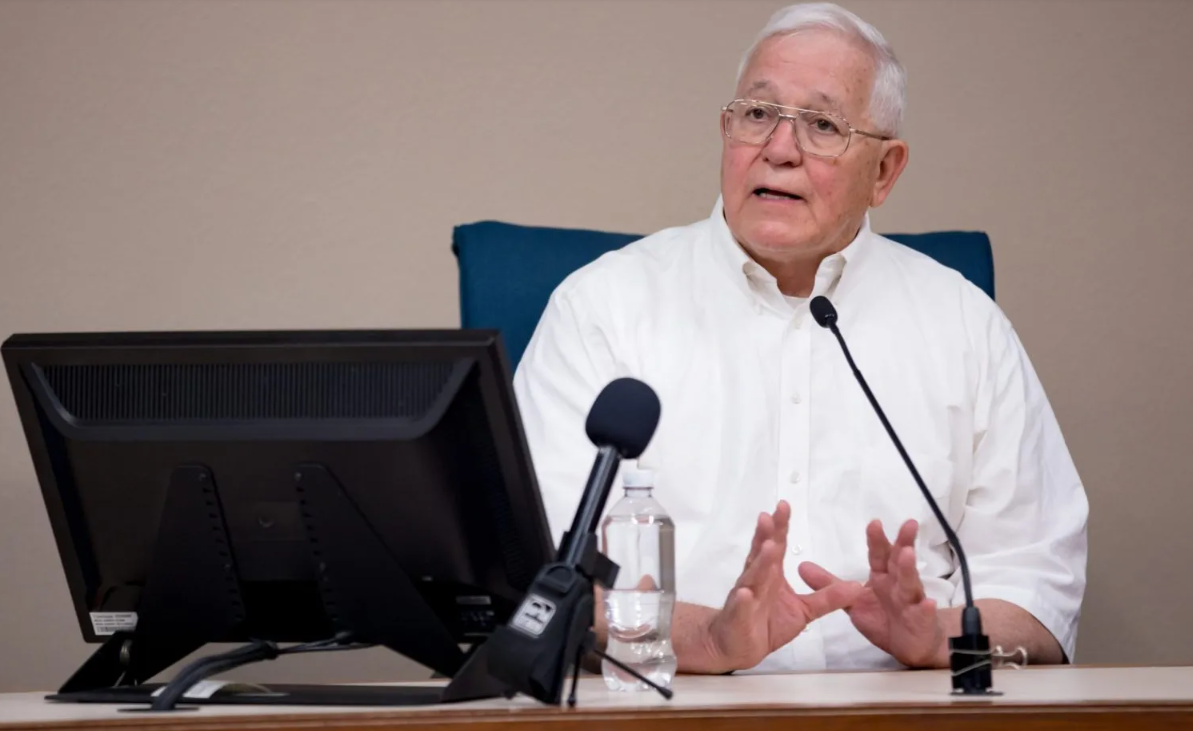Judge suggests Paxton has ‘ulterior political motives’ in Annunciation House case

by Robert Moore, El Paso Matters
March 7, 2024
An El Paso district judge lashed out at the Texas Attorney General’s Office after a lawyer said in court Thursday that Annunciation House was “stonewalling” by refusing to negotiate over documents demanded by the office.
“Hold on. This is the part where you're starting to offend my intelligence. You did not offer to negotiate. You did not offer to act in good faith,” 205th District Court Judge Francisco Dominguez told Ryan Baasch, chief of the attorney general’s Consumer Protection Division, at a hearing on Annunciation House’s request to hold off producing some documents until a judge could review whether they were legally obligated to do so
Dominguez said Annunciation House has shown a willingness to negotiate with the Attorney General’s Office, which has said it will close the nonprofit that offers humanitarian services to migrants.

“There was no attempt whatsoever to negotiate by the attorney general, which is what gives the court rise for concern that there are ulterior political motives here taking place that go outside of what the law requires, go outside of what the law demands,” he said.
Dominguez, a Democrat and former civil rights attorney, did not immediately rule after a two-hour hearing on Annunciation House’s request for an injunction or other action to allow for a court review of Texas Attorney General Ken Paxton’s demand for records and the immediate termination of Annunciation House’s ability to operate in Texas for failing to immediately produce the records.
A ruling likely will come in the next few days.
Paxton, a Republican, was not at Thursday’s hearing.

Baasch – who twice had to be reminded by the bailiff to stand when addressing the court – acknowledged in response to Dominguez’s criticism that the state law used by the attorney general to demand documents from Annunciation House “may seem to impose a very significant burden” on Annunciation House, but he said the law clearly required immediate production of documents when sought by the Attorney General’s Office.
Three representatives from the Attorney General’s Office on Feb. 7 served Annunciation House with a request to immediately examine operational records, but agreed to give the agency a day to consult with attorneys. The next day, Dominguez granted Annunciation House’s request for a temporary restraining order against the attorney general.
Annunciation House is seeking a temporary injunction that would stay in effect until Dominguez ruled on its legal obligations in regards to the attorney general’s request.
Jerome Wesevich, the attorney for Annunciation House, told the court that the agency has turned over 212 pages of records so far to the Attorney General’s Office. He said the request was “an abuse of power to try to stop Annunciation House from doing business.”

The request for documents – and subsequent court battle – comes amid a major political debate about immigration and border enforcement. Baasch told Dominguez that Paxon’s request was in response to a request by Texas Gov. Greg Abbott for an investigation into nonprofits that provide assistance to migrants. Many of those organizations, like Annunciation House, are affiliated with the Catholic church.
The only witness to testify at Thursday’s hearing was Annunciation House’s founder and director, Ruben Garcia. Much of the questioning focused on Annunciation House’s history and the services it provides.
He said that some of the records requested include medical information about people who have been assisted by Annunciation House. Garcia said trust between the guests at Annunciation House and the volunteer staff was vital to perform its mission.
“That relationship is a profound relationship, that when they share their story, their situation with us, that they believe that to be done in confidence,” Garcia said.
He also said that release of information could put Annunciation House’s guests at what he calls “houses of hospitality” at risk.
“Some of the information that is given to us could be harmful to either the refugee, him or herself, or to the sponsor, if that information were to be made known. There are people who have fled for their lives,” he said.
Baasch asked Garcia if he was aware that the law required the attorney general to keep confidential any records provided in response to the request. Garcia said he didn’t know that, but he still had concerns.
During Baasch’s cross-examination, he asked Garcia if he was familiar with the case of Laken Riley, a University of Georgia student who was beaten to death last month. Jose Ibarra, a Venezuelan national who crossed the U.S.-Mexico border in El Paso in 2022, is charged with murder in her death.
Baasch asked if Ibarra stayed at Annunciation House, and Garcia said he didn’t know.
In court filings, Paxton alleged that the Annunciation House “appears to be involved” in the operation of an illegal stash house by providing assistance to people who enter the country and evade U.S. Border Patrol agents. He also alleged the organization appears to be involved in the business of human smuggling because it provides migrants with transportation.
Garcia and his supporters have vehemently denied those accusations, and Annunciation House has never faced criminal charges for violating the laws cited in Paxton’s court filings.
During his testimony, Garcia said three volunteers quit after Paxton’s document request, concerned that they could face criminal charges.
“We depend so much on volunteers, and I'll tell you the truth, I hope God is listening to me right now in saying, we very much are hoping that others will step forward and say, you know what, we'll come down. We'll come down, we'll help out,” Garcia said at a brief news conference after the hearing.
This article first appeared on El Paso Matters and is republished here under a Creative Commons license.![]()

